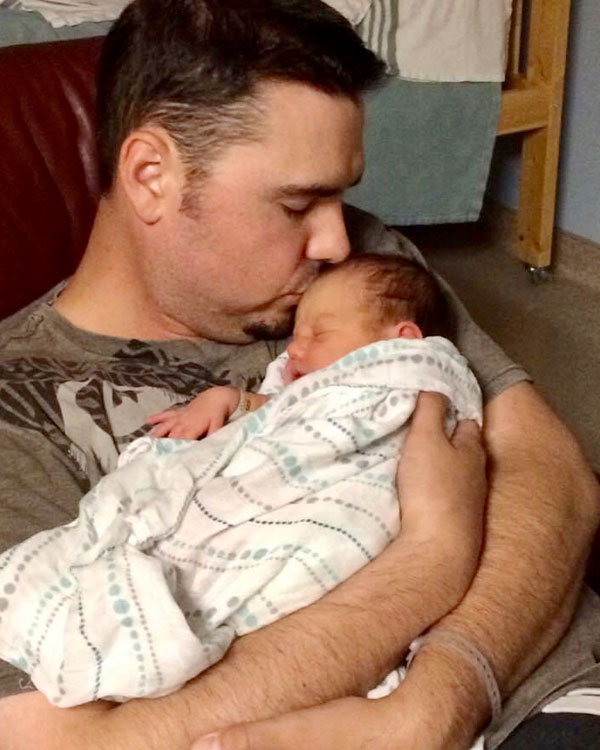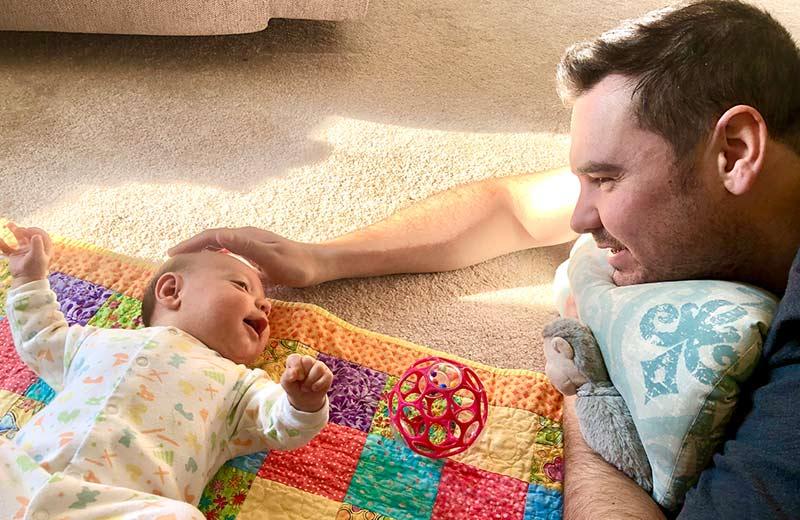(Author’s note: In this story, I’ve used the terms “father” and “dad.” I recognize this doesn’t reflect every family’s reality, but I hope the information is useful for any support person caring for a mom and a new baby.)
Hats off to all the dads out there – Happy Father’s Day! In my role as a nurse in maternal child health, I’d like to draw attention to the important role of fathers.
While each family is unique, a new baby’s arrival brings new learnings for all. I’ve definitely had my own steep learning curve as a mom of two small children. In a recent heart-to-heart with my husband, we talked about his experiences as a new dad.
To understand our shared experiences with other families, I reached out to some friends on social media. From their insights, I’d like to offer guidance for others journeying through this chapter. This may also be helpful for families thinking about starting a family.
Learning how to parent, together
During the early postpartum period, there’s a lot to learn as new parents. Sometimes referred to as the fourth trimester, the first few months after birth are when moms’ and babies’ needs are high priority. Having a support person nearby is critical as they adjust to their new life. It can be a smoother transition when partners support each other.
If it’s possible, adjust your schedule so you can be at home during the early days. If you’re working, consider taking parental leave, using vacation time, or requesting time off work when baby arrives. I’m grateful for this time at home with my husband as we started learning how to become parents, together.
Supporting the mother
New moms need support. The practical and emotional support from dad is so important. In the early weeks, moms and babies are learning how to breastfeed. Although the experience can be different with each child, fathers can support breastfeeding by helping to take care of moms. Remind them that they’re doing a great job and that they’re not alone.

Some additional ways you can offer support include:
- Help mom feel comfortable. Offer a cozy blanket, a glass of water or tea (or both!), and a snack.
- Prioritize household duties, such as cooking, dishes, laundry, and running errands (my husband said, “It was nice to be home to lighten the load and make sure you were well cared for.”).
- Take the lead on certain baby duties, like bath time or diaper changes. This can give mom the time she needs to freshen up before the next feed.
After a few weeks at home, my husband had to go back to work. We stayed connected through regular texts and phone calls. While being back at work allowed him to regain some independence, he didn’t expect meals to be ready when he came home.
Finding your role with baby
Even though the focus is mainly on mom and baby, it’s important for dad to find his special role with baby, too. To strengthen bonding with your baby, consider cuddling them skin-to-skin, carrying them in a sling for walks, and playing with them on the floor during tummy time.
In our experience, there were times when our son preferred his daddy to me. This allowed me to clock in a few extra hours of sleep between breastfeeds. When I’d wake, I’d find the two of them snuggling in the living room, dancing to calming music. My husband said, “It felt nice to be needed, I loved bonding with baby.”
It gets easier every day
Some days are monotonous. Some days are hard. Yet, as Darius Rucker sang, “It won’t be like this for long.” To help ease through the newborn stage, try:
- Playing music to create a peaceful, calming environment (when our babies were new, we had music on repeat – thank you Enya, Dan Gibson, and Johnny Cash!).
- If baby is fussy, carrying, singing, or talking calmly may help settle them.
- Stepping away and taking a breather from the situation, if you need to calm down.
For more guidance
- Dad central: A place for all dads
- Sustaining breastfeeding together: She can do it, you can help – Northern Health Stories
- Baby’s best chance: Parents’ handbook of pregnancy and baby care (look out for the “Partners” boxes through for helpful suggestions)














Comments